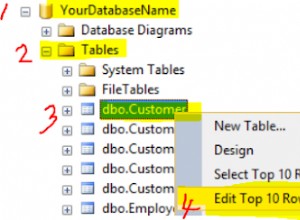Czego potrzebujemy:
Musimy mieć możliwość dołączania zewnętrznych baz danych do wewnętrznej bazy danych Room-Database bez zmiany ścieżki, w której są one przechowywane. Po ich dodaniu chcemy mieć możliwość korzystania z baz danych z obiektami Room Entity, Dao i Database. Czy jest jakiś sposób, aby to osiągnąć?
Może być łatwiej nie dołączać, ponieważ możesz użyć oddzielnej instancji bazy danych pokoju. Bez tego musiałbyś mieć oddzielne DAO, aby zaspokoić załączoną nazwę schematu (wierzę). Mówiąc, że poniższy przykład (oparty na czymś, czym bawiłem się dla kogoś i stąd raczej mylące nazwy kolumn) .
np. zakładając ATTACH DATABASE .... AS other (załączony schemat to inny ) następnie zamiast (dla głównej bazy danych)
@Query("SELECT * FROM AllUsers")
List<AllUsers> getAllAllUsers();
Potrzebujesz bezpłatnego :-
@SkipQueryVerification
@Query("SELECT * FROM other.AllUsers")
List<AllUsers> getOtherAllAllUsers();
itp.
Jednakże, jeśli zamiast tego masz coś takiego (dla głównego):-
mLPDB = Room.databaseBuilder(this,LoanPaymentDatabase.class,"mydb").allowMainThreadQueries().build();
mLPDB_DAO = mLPDB.mDao();
Wraz z (dla innych):-
mOtherDB = Room.databaseBuilder(this,LoanPaymentDatabase.class,OtherDatabaseHelper.DBNAME).allowMainThreadQueries().build();
mOtherDAO = mOtherDB.mDao();
Następnie możesz uzyskać dostęp do obu za pomocą tego samego DAO.
- Uwaga oczywiście powyższe zakłada, że schemat jest komplementarny (niekoniecznie dokładny).
Niekoniecznie dokładne?
Obejmuje również komentarz :-
Musisz najpierw przenieść dane do samego pokoju.
-
Przy odrobinie zabawy możesz obejść konieczność migracji przez oszukanie pokoju przez ustawienie user_version na 0. W takim przypadku Room ustawia numer wersji (ograniczone testowanie). Jednak nie jestem pewien, co GreenDao lub Twój serwer zrobiłyby z tego (Twoja praca domowa).
-
Moje ograniczone testy dotyczyły typowego problemu podczas migracji z posiadaniem kolumny z INTEGER PRIMARY KEY, tj. bez AUTOINCREMENT. Pokój w przypadku migracji będzie narzekał na niezgodność schematu. Więc celowo nie kodowałem AUTOINCREMENT, ustawiłem user_version na 0 i brak skarg na dostęp do bazy danych przez Room. Użyto również typu kolumny rumplestilskin i żadnych skarg.
W związku z tym uważam, że można obejść problemy z migracją z przerażającymi oczekiwanymi/znalezionymi, ustawiając user_version na 0 (i dlatego wierzę, że można obejść migrację). Oczywiście nazwy kolumn muszą się zgadzać, jeśli są zdefiniowane w encji i nie są ignorowane.
- Próbowałem również dodać kolumnę niezdefiniowaną jako Entity i użyć powyższych wyników bez skargi (te testy powinny być oczywiste w poniższym kodzie).
Przykład(y)
Poniżej znajduje się przykład bazy danych 2 Entity Room Database i na potrzeby testowania innych baza danych zbudowana poza pokojem, która wystarczająco pasuje do bazy danych pokoju, aby mogła być używana, tj. Nazwy kolumn Entity są dopasowane.
Inna baza danych
Druga baza danych, która nie jest pokojem, jest tworzona za pomocą SQLiteOpenHelper podklasa zgodnie z OtherDatabaseHelper.java :-
public class OtherDatabaseHelper extends SQLiteOpenHelper {
public static final String DBNAME = "lpolddb";
public static final int DBVERSION = 1;
public static final String ALLUSERS_TBL = "AllUsers";
public static final String PAIDUNPAID_TBL = "PaidUnpaid";
/*
@PrimaryKey(autoGenerate = true)
private long auid;
private String Name;
private int Loan;
private int TimeInMonths;
*/
public static final String ALLUSERS_COL_AUID = "auid";
public static final String ALLUSERS_COL_NAME = "Name";
public static final String ALLUSERS_COL_LOAN = "Loan";
public static final String ALLUSERS_COL_TIMEINMONTHS = "TimeInMonths";
private static final String crt_allusers_table_sql =
"CREATE TABLE IF NOT EXISTS " + ALLUSERS_TBL + "(" +
//ALLUSERS_COL_AUID + " INTEGER PRIMARY KEY AUTOINCREMENT," +
ALLUSERS_COL_AUID + " INTEGER PRIMARY KEY," +
ALLUSERS_COL_NAME + " TEXT, " +
ALLUSERS_COL_LOAN + " INTEGER, " +
"someothercolumnnotdefineinroom TEXT, " + //!!!!!!!!!! not a column in an entity
ALLUSERS_COL_TIMEINMONTHS + " INTEGER" +
")";
/*
@PrimaryKey(autoGenerate = true)
private long puid;
private int TimeInMonths;
private String PaidUnpaid;
@ForeignKey(
entity = AllUsers.class,
parentColumns = {"auid"},
childColumns = {"AllUsersReference"},
onUpdate = ForeignKey.CASCADE, onDelete = ForeignKey.CASCADE)
private long AllUsersReference;
*/
public static final String PAIDUNPAID_COL_PUID = "puid";
public static final String PAIDUNPAID_TIMEINMONTHS = ALLUSERS_COL_TIMEINMONTHS;
public static final String PAIDUNPAID_COL_PAIDUNPAID = "PaidUnpaid";
public static final String PAIDUNPAID_COL_ALLUSERSREFERENCE = "AllUsersReference";
public static final String crt_paidunpaid_table_sql =
"CREATE TABLE IF NOT EXISTS " + PAIDUNPAID_TBL + "(" +
PAIDUNPAID_COL_PUID + " INTEGER PRIMARY KEY AUTOINCREMENT," +
PAIDUNPAID_TIMEINMONTHS + " rumplestilskin, " + // !!!!!!!!!!!
PAIDUNPAID_COL_PAIDUNPAID + " TEXT," +
PAIDUNPAID_COL_ALLUSERSREFERENCE + " INTEGER " +
" REFERENCES " + ALLUSERS_TBL + "(" + ALLUSERS_COL_AUID + ") " +
"ON UPDATE CASCADE ON DELETE CASCADE" +
")";
SQLiteDatabase mDB;
public OtherDatabaseHelper(Context context) {
super(context, DBNAME, null, DBVERSION);
mDB = this.getWritableDatabase();
}
@Override
public void onCreate(SQLiteDatabase db) {
db.execSQL(crt_allusers_table_sql);
db.execSQL(crt_paidunpaid_table_sql);
}
@Override
public void onUpgrade(SQLiteDatabase db, int oldVersion, int newVersion) {
}
public long insertAllUsers(String name, int loanamount, int periodofloan) {
ContentValues cv = new ContentValues();
cv.put(ALLUSERS_COL_NAME,name);
cv.put(ALLUSERS_COL_LOAN,loanamount);
cv.put(ALLUSERS_COL_TIMEINMONTHS,periodofloan);
return mDB.insert(ALLUSERS_TBL,null,cv);
}
public long insertPaidUnpaid(int formonth, String status, long allUserreferenced) {
ContentValues cv = new ContentValues();
cv.put(PAIDUNPAID_TIMEINMONTHS,formonth);
cv.put(PAIDUNPAID_COL_PAIDUNPAID,status);
cv.put(PAIDUNPAID_COL_ALLUSERSREFERENCE,allUserreferenced);
return mDB.insert(PAIDUNPAID_TBL,null,cv);
}
}
- zobacz komentarze dotyczące osobliwości/celowo dodanych rozbieżności
- to jest wypełniane, dostępne przez alternatywną bazę danych pomieszczeń i za pośrednictwem dołączonej bazy danych w MainActivity.java poniżej
Baza danych pokoi
Dwie jednostki :-
AllUsers.java
@Entity
public class AllUsers {
@PrimaryKey(autoGenerate = true)
private long auid;
private String Name;
private int Loan;
private int TimeInMonths;
public AllUsers() {
}
@Ignore
public AllUsers(String Name, int Loan, int TimeInMonths) {
this.Name = Name;
this.Loan = Loan;
this.TimeInMonths = TimeInMonths;
}
public long getAuid() {
return auid;
}
public void setAuid(long auid) {
this.auid = auid;
}
public String getName() {
return Name;
}
public void setName(String name) {
Name = name;
}
public int getLoan() {
return Loan;
}
public void setLoan(int loan) {
Loan = loan;
}
public int getTimeInMonths() {
return TimeInMonths;
}
public void setTimeInMonths(int timeInMonths) {
TimeInMonths = timeInMonths;
}
}
i PaidUnpaid.java :-
@Entity
public class PaidUnpaid {
@PrimaryKey(autoGenerate = true)
private long puid;
private int TimeInMonths;
private String PaidUnpaid;
@ForeignKey(
entity = AllUsers.class,
parentColumns = {"auid"},
childColumns = {"AllUsersReference"},
onUpdate = ForeignKey.CASCADE, onDelete = ForeignKey.CASCADE)
private long AllUsersReference;
public PaidUnpaid() {
}
@Ignore
public PaidUnpaid(int TimeInMonths, String PaidUnpaid, long AllUsersreference) {
this.TimeInMonths = TimeInMonths;
this.PaidUnpaid = PaidUnpaid;
this.AllUsersReference = AllUsersreference;
}
public long getPuid() {
return puid;
}
public void setPuid(long puid) {
this.puid = puid;
}
public int getTimeInMonths() {
return TimeInMonths;
}
public void setTimeInMonths(int timeInMonths) {
TimeInMonths = timeInMonths;
}
public String getPaidUnpaid() {
return PaidUnpaid;
}
public void setPaidUnpaid(String paidUnpaid) {
PaidUnpaid = paidUnpaid;
}
public long getAllUsersReference() {
return AllUsersReference;
}
public void setAllUsersReference(long allUsersReference) {
AllUsersReference = allUsersReference;
}
}
Dodatkowa klasa POJO, AllUsersAndPaidUnpaidsList.java który grał z tak włączonym i używanym :-
public class AllUsersAndPaidUnpaidsList {
@Embedded
AllUsers allUsers;
@Ignore
@PrimaryKey
long auid;
@Ignore
@Relation(entity = PaidUnpaid.class,parentColumn = "auid",entityColumn = "puid")
List<PaidUnpaid> paidUnpaidList;
@Ignore
public AllUsersAndPaidUnpaidsList(AllUsers au, List<PaidUnpaid> pulist) {
this.allUsers = au;
this.paidUnpaidList = pulist;
}
public List<PaidUnpaid> getPaidUnpaidList() {
return this.paidUnpaidList;
}
public void setPaidUnpaidList(List<PaidUnpaid> paidUnpaidList) {
this.paidUnpaidList = paidUnpaidList;
}
public AllUsers getAllUsers() {
return allUsers;
}
public void setAllUsers(AllUsers allUsers) {
this.allUsers = allUsers;
}
public void outputToLog(String tag) {
StringBuilder sb = new StringBuilder("AllUsersName = ")
.append(this.allUsers.getName())
.append(" TimeInMonths = ")
.append(String.valueOf(this.allUsers.getTimeInMonths()))
;
for (PaidUnpaid pu: this.getPaidUnpaidList()) {
sb.append("\n\t TimeInMonths = ")
.append(String.valueOf(pu.getTimeInMonths()))
.append(" Paid/Unpaid = ")
.append(pu.getPaidUnpaid());
}
Log.d(tag,sb.toString());
}
}
Pojedynczy interfejs Dao.java :-
@androidx.room.Dao
public interface Dao {
@Insert(onConflict = OnConflictStrategy.IGNORE)
long[] insertAllUsers(AllUsers... allUsers);
@Insert(onConflict = OnConflictStrategy.IGNORE)
long insertAllUsers(AllUsers allUsers);
@Insert(onConflict = OnConflictStrategy.IGNORE)
long[] insertPaidUnpaid(PaidUnpaid... paidUnpaids);
@Insert(onConflict = OnConflictStrategy.IGNORE)
long insertPaidUnpaid(PaidUnpaid paidUnpaid);
@Update(onConflict = OnConflictStrategy.IGNORE)
int updateAllUsers(AllUsers... allUsers);
@Update(onConflict = OnConflictStrategy.IGNORE)
int updateAllUsers(AllUsers allUsers);
@Update(onConflict = OnConflictStrategy.IGNORE)
int updatePaidUnpaid(PaidUnpaid... paidUnpaids);
@Update(onConflict = OnConflictStrategy.IGNORE)
int updatePaidUnpaid(PaidUnpaid paidUnpaid);
@Delete
int deleteAllUsers(AllUsers... allUsers);
@Delete
int deleteAllUsers(AllUsers allUsers);
@Delete
int deletePaidUnpaid(PaidUnpaid... paidUnpaids);
@Delete
int deletePaidUnpaid(PaidUnpaid paidUnpaid);
@Query("SELECT * FROM AllUsers")
List<AllUsers> getAllAllUsers();
@Query("SELECT * FROM AllUsers WHERE auid = :id")
List<AllUsers> getOneAllUsersById(long id);
@Query("SELECT * FROM PaidUnpaid")
List<PaidUnpaid> getAllPaidUnpaids();
@Query("SELECT * FROM PaidUnpaid WHERE puid = :id")
List<PaidUnpaid> getOnePaidUnpaidById(long id);
@Query("SELECT * FROM PaidUnpaid WHERE AllUsersReference = :allUsersid")
List<PaidUnpaid> getPaidUnpaidsForAllUsersId(long allUsersid);
/*************
* Some Additional DAO's for attached not required for alternative helper
* in practice you would likely need attached versions of all
************/
@Query("SELECT * FROM other.PaidUnpaid WHERE AllUsersReference = :allUsersid")
@SkipQueryVerification
List<PaidUnpaid> getOtherPaidUnpaidForAllUsersId(long allUsersid);
@SkipQueryVerification
@Query("SELECT * FROM other.AllUsers")
List<AllUsers> getOtherAllAllUsers();
}
Klasa bazy danych pokoi LoanPaymentDatabase.java
@Database(entities = {AllUsers.class,PaidUnpaid.class},exportSchema = false,version = 1)
public abstract class LoanPaymentDatabase extends RoomDatabase {
public abstract Dao mDao();
}
Łączenie wszystkiego w całość
Wreszcie aktywność, która:-
-
Tworzy i wypełnia inne (niepomieszczeniowa) baza danych (jeśli nie istnieje) do testowania. Ustawianie user_version (wersja bazy danych w Android Talk) na 0.
-
Tworzy, w razie potrzeby, wersję bazy danych Room.
- Dodaje kilka wierszy do wersji Room.
- Przesyła dane w wersji Room do dziennika.
- Tworzy alternatywną bazę danych pokojów przy użyciu innego baza danych.
- Wyprowadza dane w innym baza danych za pośrednictwem pokoju.
- Dołącza inne bazy danych do wersji Pokoju.
- Wysyła dane z obu za pośrednictwem oryginalnej bazy danych pomieszczeń, uzyskując dostęp do dołączonych innych bazy danych za pośrednictwem dodatkowych interfejsów DAO, które obejmują inne.???? .
MainActivity.java
public class MainActivity extends AppCompatActivity {
LoanPaymentDatabase mLPDB;
Dao mLPDB_DAO;
LoanPaymentDatabase mOtherDB;
Dao mOtherDAO;
Random rnd = new Random();
@Override
protected void onCreate(Bundle savedInstanceState) {
super.onCreate(savedInstanceState);
setContentView(R.layout.activity_main);
manageOtherDatabase();
mLPDB = Room.databaseBuilder(this,LoanPaymentDatabase.class,"mydb").allowMainThreadQueries().build();
mLPDB_DAO = mLPDB.mDao();
// Add some(2) AllUsers
mLPDB_DAO.insertAllUsers(new AllUsers("Fred",5000,5));
mLPDB_DAO.insertAllUsers(new AllUsers("Mary", 4000,6));
// Add Some PaidUnpaid's for each AllUsers
// Random amount with random paid or unpaid
// This is just for demonstration and doesn't reflect what would typically be done
List<AllUsers> allusers = mLPDB_DAO.getAllAllUsers();
for (AllUsers au: allusers) {
int lc = rnd.nextInt(4) + 1;
int month = 1;
for (int i=0; i < lc; i++) {
String paid = "Paid";
if((rnd.nextInt(2) % 2) > 0 ) {
paid = "Unpaid";
}
mLPDB_DAO.insertPaidUnpaid(new PaidUnpaid(month++, paid, au.getAuid()));
}
}
//Extract all AllUsersAndPaidUnpaid (i.e each AllUsers with the related PaidUnpaid for the AllUsers)
ArrayList<AllUsersAndPaidUnpaidsList> aupulist = new ArrayList<>();
for (AllUsers au: allusers) {
List<PaidUnpaid> pulist = mLPDB_DAO.getPaidUnpaidsForAllUsersId(au.getAuid());
aupulist.add(new AllUsersAndPaidUnpaidsList(au,pulist));
}
// Output the results
for (AllUsersAndPaidUnpaidsList aupu: aupulist) {
aupu.outputToLog("INITALAUPU");
}
//Use separate openHelper rather than ATTACH
mOtherDB = Room.databaseBuilder(this,LoanPaymentDatabase.class,OtherDatabaseHelper.DBNAME).allowMainThreadQueries().build();
mOtherDAO = mOtherDB.mDao();
ArrayList<AllUsersAndPaidUnpaidsList> otheraupulist = new ArrayList<>();
for (AllUsers oau: mOtherDAO.getAllAllUsers() ) {
otheraupulist.add(new AllUsersAndPaidUnpaidsList(oau,mOtherDAO.getPaidUnpaidsForAllUsersId(oau.getAuid())));
}
for (AllUsersAndPaidUnpaidsList aupu: otheraupulist) {
aupu.outputToLog("ALTDBAUPU");
}
// User Attach
SupportSQLiteDatabase main_sdb = mLPDB.getOpenHelper().getWritableDatabase();
SupportSQLiteDatabase other_sdb = mOtherDB.getOpenHelper().getWritableDatabase();
main_sdb.execSQL("ATTACH DATABASE '" + other_sdb.getPath() + "' AS other");
ArrayList<AllUsersAndPaidUnpaidsList> attachaupulist = new ArrayList<>();
for (AllUsers aau: mLPDB_DAO.getAllAllUsers()) {
attachaupulist.add(new AllUsersAndPaidUnpaidsList(aau,mLPDB_DAO.getPaidUnpaidsForAllUsersId(aau.getAuid())));
}
for (AllUsers aauother: mLPDB_DAO.getOtherAllAllUsers()) {
attachaupulist.add(new AllUsersAndPaidUnpaidsList(aauother,mLPDB_DAO.getOtherPaidUnpaidForAllUsersId(aauother.getAuid())));
}
for (AllUsersAndPaidUnpaidsList aupu: attachaupulist) {
aupu.outputToLog("ATTACHEDAUPU");
}
mLPDB.close();
}
/*********
* For testing purposes - Populate the OTHER database to be used
*********/
private void manageOtherDatabase() {
OtherDatabaseHelper mODBHlpr = new OtherDatabaseHelper(this);
SQLiteDatabase db = mODBHlpr.getWritableDatabase();
db.execSQL("PRAGMA user_version = 0");
if (DatabaseUtils.queryNumEntries(db,OtherDatabaseHelper.ALLUSERS_TBL) > 0) {
db.close();
mODBHlpr.close();
return;
}
db.beginTransaction();
for (int i= 0; i < 5; i++) {
long auid = mODBHlpr.insertAllUsers("AU" + String.valueOf(i),10000 + 1,5 + i);
for(int ii = 0; ii < 5; ii++) {
mODBHlpr.insertPaidUnpaid(ii,"Paid",auid);
}
}
db.setTransactionSuccessful();
db.endTransaction();
db.close();
mODBHlpr.close();
}
}




